Bourke Ulick J. Easy lessons, or Self-instruction in Irish / Легкие уроки: самоучитель ирландского языка
Подождите немного. Документ загружается.

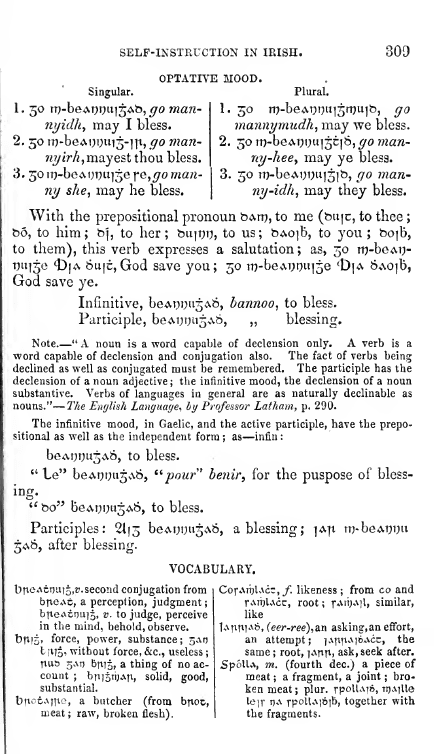
SELF-INSTRUCTION IN IRISH.
3oa
OPTATIVE MOOD.
Singular.
1.
50
rt)-bei^T)r)U]5A&,
^£>
man-
nyidh,
may
I bless.
2.
50
TT)-beAi)i)ui5-i|t, go man-
7i7/irh,msLyest
thou bless.
3.
5on7-beAur)U]5e j*e,^o/wa?z-
«3/
she,
may he bless.
Plural.
1.
50
Ti7-beAt)r)iti5rt;u|b,
^0
mannymudh,
may
we bless.
2.
5on7-beAT)r)u]5C]6,^o
ma«-
ny-hee, may
ye bless.
3.
50
TD-beAt)r)ui5|f5,
(70
?;2a«-
ny-idh^ may they
bless.
With
the
prepositional pronoun
bArt), to me
(buic,
to thee
;
bo,
to
him;
b],
to her
;
bu|t)r),
to
us;
bAoib,
to you
; boib,
to them),
this verb
expresses a
salutation; as,
50
nj-beAt)-
T)ii]5e
i)|A
6uié,
God save you;
50
n)-beAi)r)u]5e
Í)ia
ÓAOjb,
God
save
ye.
Infinitive,
beAT)r)u5v\6,
hannoo, to bless.
Participle,
beAUT)U5AÓ,
„
blessing.
Note
—
" A noun is
a
word capable of
declension
only.
A verb
is a
word
capable
of declension and
conjugation also.
The
fact of
verbs being
declined as well
as conjugated must be
remembered.
The participle has
the
declension
of a
noun
adjective; the infinitive mood,
the
declension
of
a
noun
substantive. Verbs
of languages in
general are as
naturally
declinable
as
nouns."
—
The English
Language, by
Professor
Latham,
p.
290.
The infinitive
mood, in Gaelic, and the active participle,
have
the prepo-
sitional
as well as the independent form
; as—
infin
:
beAr;n)ii5A6,
to bless.
"
Le" beAor)ii5v\6,
^^
pour' benir, for the puspose
of bless-
ing.
"
hoi"
beA^ijujAÓ,
to bless.
Participles:
2l|3
beAut)ii5A6, a blessing;
]A|i nj-beATjuu
5AÓ,
after blessing.
VOCABULARY.
t)Tle<^cT)Ul^,».
second conjugation
from
bneAc,
a perception,
judgment;
btieAcnuTo' ^-
to judge,
perceive
in the
mind,
behold,
observe.
tJMo'
force,
power,
substance
;
5A0
1
1M5,
without
force,
&c., useless
;
nus
5^1)
bnis,
a
thing
of
no
ac-
count
;
bnisiijAtt,
solid,
good,
substantial.
btiocAjTiG, a
butcher
(from
bnoc,
meat;
raw,
broken
flesh).
CorAti;lAcr,/.
likeness
;
from
co and
r
ATijUcc,
root
;
fArijAil,
similar,
like
lAiini<*6,
(eer-ree),an
asking,an
effort,
an
attempt;
iat^í\aióacc,
the
same
; root,
lAnt^,
ask,
seek
after.
5póUA,
m. (fourth dec.)
a piece of
meat
; a fragment,
a
joint
;
bro-
ken
meat; plur.
rpollAió, n^AiUe
lejv
nA rpoUAi&ib,
together with
the
fragments.
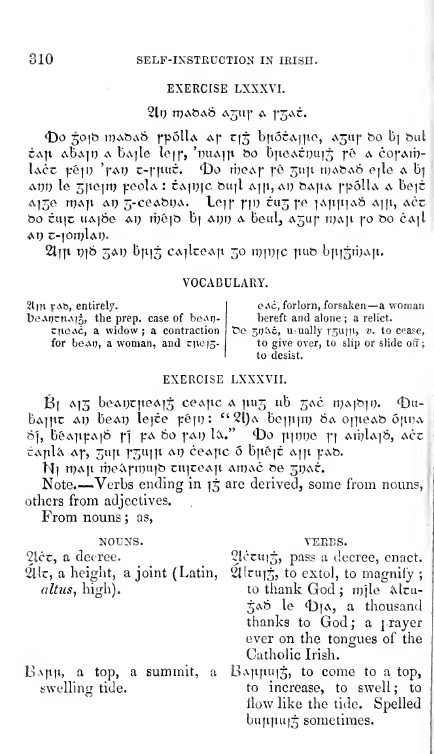
310
SELF-INSTRUCTION
IN
IRISH.
EXERCISE LXXXVI.
2lr)
TTJAbAÓ
AJU]*
A
f5AC.
i)o
50|b
tDA&AÓ
fpóllA
A|*
c|5
bitócAi|te,
A5uf
bo b]
bul
CA]t AbA]r)
A
bA]le
le|i*, 'duaiii
bo
b]xcAci}ui5
ye
a
cofArb-
i
Iacc
yé]\) 'y4^v
c-ffiuc.
i)o
rbeAf
]-é
ju^i njAbAÓ
e]le
a
b]
I
ATjij
le
5fieitt)
^ooIa
:
caji^ic
bu|l
A]it,
ai) bA]iA
fpóllA
a
be]c
A]5e
rnA|t
At)
5-ceAbt)A.
l.e]|*
|*|i)
C115 ]*e
]A|t|t]A6 a]|i,
acc
bo cujc uA|6e ai)
Tt)é]b
b] ai)I)
a
beiil,
A5ii|* n^Aji
|*o
bo
caiI
At)
C-)Ort)lAt).
2li|t
V]^
5<M)
b]ti5
CAilceAfi
50
n)]V\c
jtiib
bitigtrjAjt.
.
VOCABULARY.
2l|n
pAb,
entirely.
beATjcnAJo,
the prep, case of
he^v-
cneAC,
a
widow
; a
contraction
for beAtj,
a
woman,
and cne;5-
eAc, forlorn, forsaken
—
a woman
bereft and alone
;
a
relict,
tic
50^6,
u:ually
rsum»
'"•
to
cease,
to give over, to
slip or slide
off;
to
desist.
EXERCISE LXXXVII.
B]
A15
beAr)CTieA]5
ceA^ic a
1^115
ub
5AC
ttJAjb]!). i)u-
bA]]tc At)
beAi)
\e]ie
]:é]v
:
"
21)a
bc)it]it)
bA
oijieAb
ó[iija
6],
béA|tpAib
x']
^A
60 ]*At) U\." í)o ]t]t)i)e
|*i
AtbUjO,
acc
cAjilív
A]*,
5u]t
]*5U]|t
At) ceA|tc
ó
b|té|c
A]]i
|:Ab.
M|
tDAji
rbeív|'ir)uib
ciiiceA|t atoac
be
5i)Aé.
Note.
—Verbs
ending in
^5
are derived,
some from nouns,
others
from
adjectives.
From nouns ;
as,
NOUNS.
2lcc,
a
decree.
21
Ic,
a
height, a joint (Latin,
alius,
high).
BAjtjt,
a
top, a
swelhni:
tide.
VERBS.
2IÓC1115, pass
a
decree, enact.
2llrui5j
to
extol,
to
magnify
;
to
thank
God
;
rjjjle iilcu-
5AÓ
le
<DiA,
a
thousand
thanks
to
God; a
jirayer
ever on
the tongues of the
Catholic Irish.
BA|x|tu|5,
to
come to
a top,
to increase,
to swell ; to
flow like
the tide. Spelled
bu|iitu|5 sometimes.
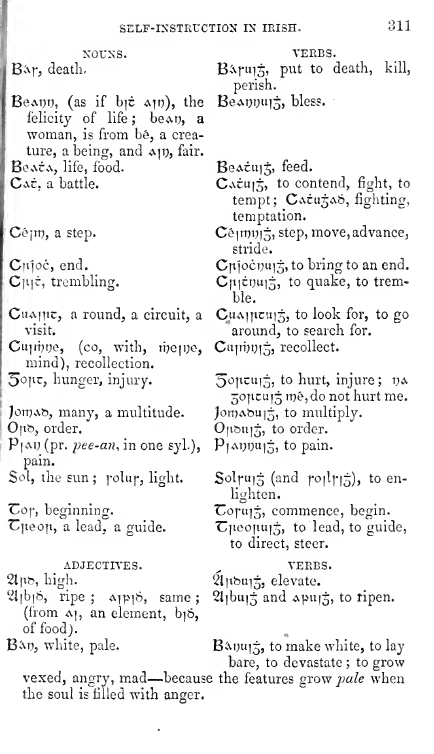
SELF-IXSTRUCTION IN
IRISH.
311
XOUNS.
VERBS.
Bivr?
death.
Bi\riil35
P^^t
to death,
kill,
perish.
BeAt)r), (as if
b^c A^t)),
the BeAWU]5,
bless,
felicity
of life
;
heAV),
a
woman,
is from
be,
a crea-
ture,
a being, and A]r), fair.
BcACA, life,
food.
BeAcii|5,
feed.
Cac,
a battle. Cacu^j,
to
contend, fight,
to
tempt;
CAC115AÓ, fighting,
temptation.
Cé|rn,
a step.
Cé]mv]'5,
step,
move,
advance,
stride.
C]\]oc, end.
Cftioct)ii]5,
to
bring
to
an
end.
Ciijc,
trembling.
Citici;ui3,
to
quake,
to
trem-
ble.
CiiAiTtc,
a
round,
a circuit,
a
Cua]|icui5, to
look for,
to go
visit.
around,
to
search for.
Cu]n)\)e,
(co,
with,
n)e]V&, Cu]rbT;i5,
recollect.
mind),
recollection,
^ofic,
hunger,
injury. 3*^|tcu]5,
to hurt, injure
;
t?a
50]tcui5
ti7é,do
not
hurt me.
)orr)v\i>,
many,
a multitude.
jon)Abiii5, to multiply.
j
Ofib,
order.
Oiibajj,
to
order.
I
Pi
At)
(pr. pee-an,
in
one syl.),
P|Ar)t)ui3,
to pain.
!
pain.
'
Sol, ihe sun
;
Toliif*,
light.
Solrui5
(and
X^\h'\o)i
to en-
lighten.
"Cox,
beginning.
"Coi-uij,
commence,
begin.
"Cjteoit, a lead,
a
guide.
'C|ieo]ui|5,
to
lead, to
guide,
to
direct, steer.
ADJECTIVES.
^
VERBS.
2ln&,
high.
2Í|ibui3,
elevate.
'illbjó,
ripe
;
Aip^o,
same
; 2iibui5
and Apu|5, to
ripen.
(from
A],
an
element,
b^Ó,
of food).
Bi\r), white,
pale.
Bcm^ujj,
to
make
white, to lay
bare,
to devastate ;
to grow
vexed, angry,
mad—
because
the
features
grow
pale
when
the soul
is filled
with anger.
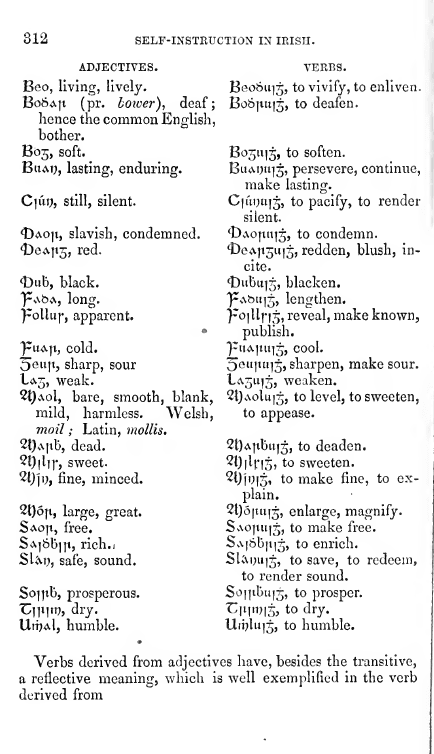
312
SELF-INSTEUCTION IN IRISH.
ADJECTIVES.
Beo,
living, lively.
Bo8A|t (pr. boioer),
deaf;
hence the
common English,
bother.
B03,
soft.
BuAt),
lasting,
enduring.
Cjui), still,
silent.
Í)ao|i, slavish,
condemned.
4)eA]i5,
red.
<t)ub,
black.
pAbA,
long.
"polliif, apparent.
«
"puAjt,
cold.
3eu|i,
sharp,
sour
'La3,
weak.
^Aol,
bare, smooth, blank,
mild,
harmless.
Welsh,
moil
;
Latin,
mollis.
2t)A|tb,
dead.
^Óillf,
sweet.
21)]!),
fine,
minced.
2t)óit,
large,
great.
Sao|i,
free.
SAi6b)|i,
rich.i
Sl<M),
safe,
sound.
Soijtb,
prosperous.
'C]]\]xx), dry.
UtíjaI,
humble.
Beoóui
j,
to
vivify,
to
enliven.
BoÓ]tu|5,
to
deafen.
Bojujj,
to
soften.
BuAi)u]3, persevere,
continue,
make lasting.
C|úi;u]5,
to
pacify,
to
render
silent.
í)A0ítu]3,
to
condemn.
í)eA]t3ui3,
redden, blush,
in-
cite.
i)ubui3,
blacken.
'pAí5U]3,
lengthen.
'po|ll|'i3,
reveal, make known,
publish.
piiA|iiii3, cool.
3eiiliiii3,
sharpen, make sour.
'LA3U13,
weaken.
2l)v\olui3,
to level,
to
sweeten,
to
appease.
2t)Aitbu|3,
to
deaden.
^)|lri5>
to
sweeten.
^)j'il3i
to
make
fine, to
ex-
plain.
2t)ó(tii]3,
enlarge,
magnify.
Sv\oiiu|3,
to
make
free.
Sv\ióbft]3,
to enrich.
SU\i;u|3,
to
save,
to
redeem,
to
render
sound.
Soi|tbii|3,
to prosper.
TfiimiS,
to
dry.
Urt?lu]5,
to
humble.
Verbs
derived
from
adjectives
have,
besides
the
transitive,
a
reflective meaning,
which
is
well exemplified
in
the
verb
derived from
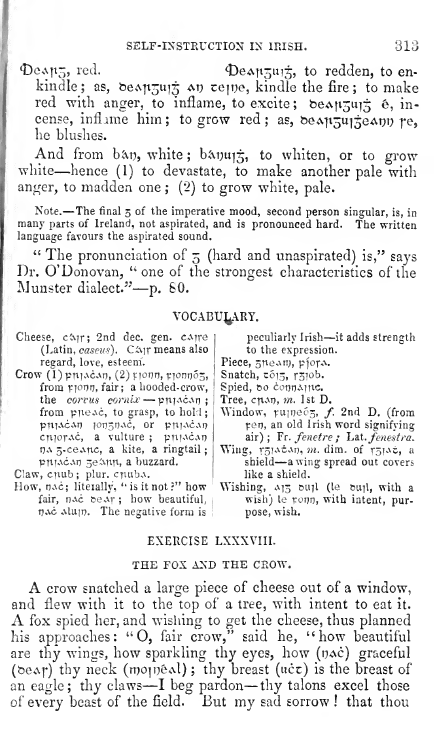
SELF-INSTRUCTION
IN lEISH.
313
Í)e^]t3,
red.
í)eAii5ui3, to redden,
to
en-
kindle
;
as,
feeA-fi3ui3
at;
cejrie, kindle
the fire;
to make
red
with anger,
to
inflame,
to
excite
; beA|i5U]5
&,
in-
cense, inflame
him
;
to
grow
red
;
as,
í5eA]t5U]5eAi;T;
fe,
he
blushes.
And
from bat),
white
;
bCM;u]3,
to
whiten,
or to
grow
white
—
hence
(1)
to
devastate,
to make
another
pale
with
anger,
to
madden
one
;
(2)
to grow
white, pale.
Note.
—The
final
5
of the imperative
mood,
second person
singular,
is,
in
many
parts
of Ireland, not aspirated,
and
is pronounced
hard.
The
written
language favours
the
aspirated sound.
"
The
pronunciation of
3
(hard and
unaspirated)
is,"
says
Dr.
O' Donovan,
"one
of
the
strongest
characteristics
of
the
AJunster
dialect."
—
p.
60.
VOCABU^RY.
Cheese, civ^r; 2nd dec. gen. cAjre
(Latin,
caseus).
Cixir
means
also
regard,
love,
esteem".
Crow
(1)
pni-\c.\n,
(2)
Fioop, x}onr)o-s,
from V]or)\), fair;
a hooded-
crow,
the corvus coruLc
—
pnjACAr)
;
from piiev\c,
to
grasp,
to holri
;
pTilAcAH lODSDAc,
or
pn|Ac.\n
cfi]orAC, a
vulture
;
prih^c^n
VA
s-ceA^xc, a
kite, a
ringtail
;
pniACAo
5ei\T^n.
a
buzzard.
Claw, cv-nh
;
plur.
ctuibA.
How,
nAc;
liteially, "is it not?"
how
peculiarly
Irish—it adds strength
to the expression.
Piece,
sneAn;,
pforA.
Snatch, CÓ15,
rsiob.
Spied,
00
doDoAinc
Tree,
ctiah,
m.
1st
D.
^Vindow,
viM''eÓ5, /.
2nd
D.
(from
fen,
an
old
Irish word
signifying
air); Fc.
fenetre
;
Lat.
fenestra.
Wug,
r^].\t,\{},
m. dim. of
Xoh'^t,
a
shield
—awing
spread
out
covers
like a
shield.
Wishing,
A15
&uil
(le
ijuil, with
a
fair,
HAc
oeAv
;
how
beautiful,
j
wish) le
vonn,
with
intent,
pur-
ijAc
Aluirj. The
negative
form is
!
pose,
wish.
EXERCISE LXXXVIII.
THE FOX
AND
THE CROW.
A
crow
snatched
a
large piece
of cheese
out of
a window,
and
flew with it to
the top
of
a
tree, with intent
to eat it.
A
fox
spied her, and
wishing to get the cheese, thus
planned
his
approaches: "O,
fair
crow," said
he,
"how beautiful
are thy
wings, how
sparkling
thy
eyes,
how
(i)ac)
graceful
(beA^-) thy
neck
(rr)0]i)&Al)
;
thy
breast
(«cc) is the
breast
of
an eagle; thy
claws—
I
beg pardon
—
thy
talons
excel
those
of
every
beast
of the field. But
my
sad
sorrow
! that
thou
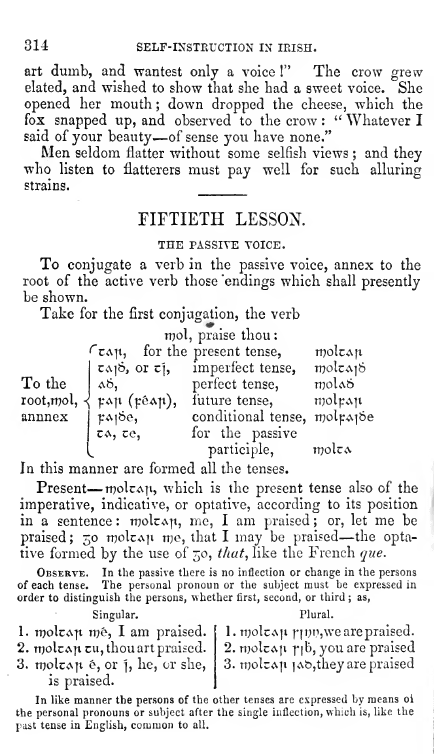
314
SELF-INSTEUCTION
IN
IRISH.
art dumb, and
wantest only
a voice
!"
The crow grew
elated, and wished
to show that
she
had
a
sweet
voice.
She
opened
her
mouth
; down dropped the cheese, which the
fox
snapped up,
and
observed to the crow
:
"
Whatever
I
said of your
beauty
—
of
sense you have none."
Men seldom
flatter without
some
selfish
views ;
and
they
who
listen
to
flatterers must pay well for such alluring
strains.
FIFTIETH
LESSON.
THE PASSIVE VOICE.
To conjugate a
verb
in the passive
voice, annex
to the
root of
the
active verb those "endings
which shall
presently
be
shown.
Take for the first conjugation,
the verb
n)o\, praise
thou
:
'^CA]i,
for the present tense,
TtjolcAjt
CAjó,
or c],
imperfect
tense, idoIcajó
To the AÓ, perfect tense, moUo
root,TT)ol,
-{
|:A|t
(]íéA|i), future
tense,
n)olpA|i
annnex I
^iAjoe,
conditional
tense,
TrjolpA^óe
I
CA, ce, for the
passive
l^
participle,
n^olcA
In
this
manner are formed all the
tenses.
Present
—
molcAii,
which
is the
present
tense also of
the
imperative,
indicative, or optative, according to
its position
in
a sentence
:
n)olcA]i, me,
I
am praised
;
or,
let me
be
praised
;
30
idoIcaix
n)e, that I may be
praised
—
the
opta-
tive
formed
by
the
use
of
50,
that,
like the
French (j[iie.
Observe.
In the passive there is no
inflection or change
in the
persons
of each tense.
The personal pronoun or the
subject must be expressed
in
order
to distinguish
the persons,
whether first,
second,
or
third
;
as.
Singular.
Plural.
1.
rDolcAji
f]i)r),we
are
praised.
2.
n^olcAjt
fib,
you
are
praised
3. rr)okA|t
iA&,they
are
praised
1.
n7olcA|t rt)é, I am praised.
2.
n)olcA|icu,
thou art praised.
3.
n)olcA|i
é,
or
b
he, or she,
is praised.
In like
manner
the
persons of
the other tenses are
expressed by
means ol
the
personal
pronouns or
subject after
the single inflection,
which is,
like
the
past
tense in
English, common to
all.
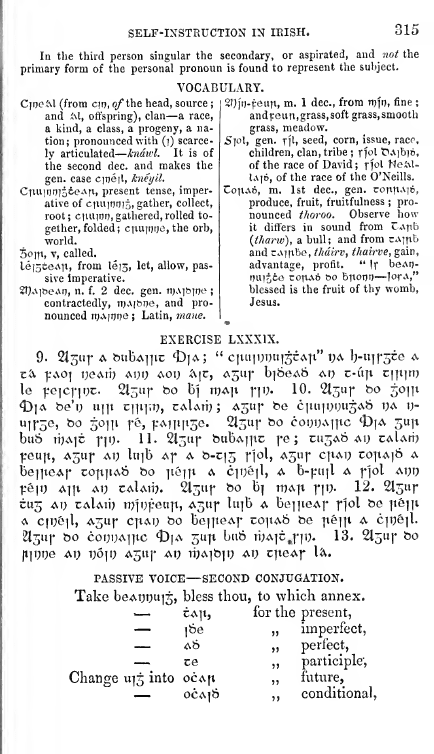
SELF-INSTRUCTION
IN
IRISH.
315
In
the
third
person
singular the secondary,
or
aspirated,
and
not the
primary form
of
the
personal
pronoun
is
found to
represent
the
subject.
VOCABULARY.
Si})r)-vcutt,
m. 1
dec,
from
nifn,
fine
;
andt:eun,grass,soft
grass,smooth
grass,
meadow.
5|ol, gen.
rfl,
seed,
corn,
issue,
race,
children, clan,
tribe
;
rfol
ttAibio,
of
the
race
of
David
;
rfol
MeM-
lA]D, of the race
of
the
O'Neills.
CoiivNó,
m.
1st dec,
gen. rontiAjó,
produce,
fruit,
fruitfulness
;
pro-
nounced
tlioroo.
Observe how
it differs in
sound
from
CATib
{tharw),
a
bull;
and
from CAXjfib
and
cAiixbe,
tháirv,
thab~ve,
gain,
advantage,
profit.
"
lr
beArj-
nui5CO
coTtAó
bo
bnoT)ti
—
lofA,"
blessed
is
the fruit
of
thy
womb,
Jesus.
CjoeM
(from c]ti,
of
the
head, source
;
and
X\l,
offspring),
clan—a
race,
a
kind,
a
class, a
progeny,
a
na-
tion;
pronounced
with
(i)
scarce-
ly articulated
—
knaui.
It is of
the second
dec.
and makes
the
gen. case
c)T)é|l,
kneyil,
Cnuionio'ieAtx,
present
tense, imper-
ative of
ct\u]t)nio,
gather,
collect,
root;
ctiuinn.
gathered, rolled to-
gether,
folded ;
ctiuiooe,
the orb,
world.
3oiri,
V,
called,
lé]5ceAtt,
from
léi5,
let, allow, pas-
sive
Imperative.
2I)A]beAn,
n. f.
2
dec
gen.
tijAibipe
;
contractedly,
n^\|br)e, and
pro-
nounced n^AiTjoe
; Latin,
mane.
EXERCISE
LXXXIX.
civ ^AO] l^eAii)
A1)tJ
AOl)
iVJC,
A5U|*
bjÓeAÓ
AT) C-Ú|l
C]]t]n)
le
}^e\cx]\K.
2l5iif
bo
bi
jdaji
i*]1).
10.
2l5Hf
bo
50111
<DiA
be'
I)
ui]t
cjitiit),
caUtt»
;
A5uf
be
cituii)i;u5A6
t)A
1)-
uii'pe,
bo
gojit |-é,
]:Ai|t|t5e.
2l5iir
bo
coduaijic
Í)ia
51111
bu6
Tb^ic
fp;.
11.
215111*
bubAi|tc
fe;
CU5A8 ai?
cAUrb
|:eu|t,
A5uf
at)
liiib
a|*
a
b-ci5 tiol,
a5u|*
citAi? co]tAi6
a
be]iteAf
coitjtAÓ
bo
]iéi|t
0.
Cjuéil,
a b-piiil
a
j-iol
ATjrj
Tíéit)
Ai|i
AT) caIatt).
2l5ui*
bo
b]
TDA^t
x\V-
12.
2l5ur
CU5
AT) caIait)
rt)ii)feiiit, A5Uf
litib
a bei|ieA]*
fiol
be
]\'e-\yi.
A
ciT)&il,
A5u|*
CjtAi) bo
beiiteA]'
coitAÓ
be
|téi|i
a ciT;éjl.
2l5ui*
bo coi;i)A]|tc
«DfA
5U|i
bii6
TÍMjé^fii).
13.
2l5Uf
ho
|l]T)t)e
AT)
T)Ó]I)
A5U[*
AT) TÍ)A]b]1)
AT)
C|teA|*
líV.
PASSIVE VOICE
—
SECOND
CONJUGATION.
Take
beAi)T)ui5,
bless
thou,
to which annex.
^
CA|1,
—
jbe
—
a6
—
ce
Change
U15 into
ocA}t
OCA]8
for the
present,
„
imperfect,
„
perfect,
,,
participle,
,,
future,
,,
conditional.
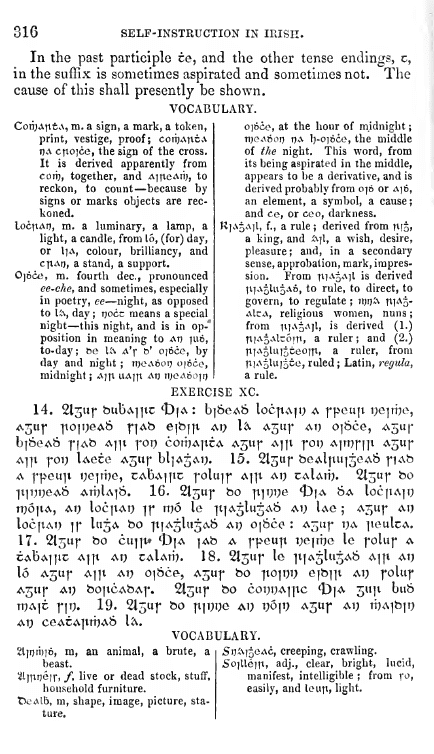
316
SELF-INSTRUCTION
IN
IRISH.
In the past participle ce, and
the other tense endings,
c,
in
the
suffix is
sometimes
aspirated
and sometimes
not. The
cause
of this shall
presently
be shown.
VOCABULARY.
oi6ce,
at the hour of
midnight
;
TtjeAoorj
v^
l)-o]6ce, the
middle
of the night. This word,
from
its
being
aspirated
in the middle,
appears to
be
a derivative, and is
derived
probably
from o]ó or
aid,
an
element,
a
symbol, a cause
;
and
ce, or
ceo, darkness.
R]A5Ail, f.,
a
rule ;
derived from
nioi
a king, and
i\]\,
a
wish, desire,
pleasure; and, in
a
secondary
sense,
approbation, mark,
impres-
sion. From
tiiAgAjl
is
derived
TxiA5lu3Aó,
to
rule,
to direct,
to
govern,
to
regulate
;
ii;r)-^
m^o-
AlcA,
religious
women,
nuns
;
from
ii]A5A]l,
is derived
(1.)
njAjAlrójTi, a
ruler; and
(2.)
ni^^ol'-Mo^eoit^,
a
ruler, from
T^U^olwio'^'i»
ruled
;
Latin,
regula,
a rule.
ConjAttfeA,
m. a
sign,
a mark,
a
token,
print, vestige,
proof; cotijAncA
DA ci^oicc,
the sign of
the
cross.
It is derived apparently from
cori;,
together,
and AitteAtij,
to
reckon,
to count —
because
by
signs
or
marks
objects are rec-
koned.
locfiAn, m. a luminary,
a
lamp, a
light,
a candle, from
15,
(for) day,
or
l)A,
colour, brilliancy,
and
cttAn,
a stand,
a
support.
OjDce,
m.
fourth dec, pronounced
ee-che,
and sometimes, especially
in poetry,
ee—
night,
as opposed
to U\,
day
;
ijocc
means
a
special
night
—this night, and
is in op-*
position
in meaning
to An ]uó,
to-day; be
U\
a'x
&'
oióce, by
day and night
; njeAoor)
oiece,
midnight; A]\\
uAjft
An njeAooiD
EXERCISE
XC.
14.
213111*
bubA]]ic
i)i<v:
bjOeAO
Ioc]iaio a
fpeuji
ve]rne,
A3u|* ^tojueAÓ
tl^^
^l^lí^
^^
^^
'^'S^^X
^^'^
oi^ce,
A5uf
b]6eA6 ]*(Ab
A]]!
\o\}
corbAjtcA a5U|*
A^jt ]*oi)
Airrjfnt
A5uf
Ai|i
yox)
lAece
A5uf
bl]A5At).
15.
2l5ui*
t5eAl|tu]5eA6
|*iAb
A
|'peu]i
t;e]rbe, CAbAijtc
folu]i*
A]]t
Atj
CAÍArb.
2l5U|*
bo
-[xjUUeAO
AtblAió.
16.
2I5UI*
bo
jtiuue <t)iA
6a
locii<\|u
njófiA,
At;) locjiAt}
^x
rrjo le ]1]A51u5a6
au
Ue
;
A^ixf
ai)
locftAU
It*
^"5^'^
"^^
T^I<^5^"5a6
At)
o|6ce
:
a5u|* t;<v jiguIca.
17. 2l5U|-
bo
cu]|i»
i)iA
jAb
A
]*peii]t \)e\x[)e le
|*oluf
a
CAbAijic
Ajjt AT}
caIatt».
18.
2l5Uf
le
]via51u5a8
aiji
au
I0 A511]*
Ai|i
Ai) 0]6ce, A5U1* bo
|to]i)i) &p]\x
Ai;
]*oluf
A5Uf
At)
bo|icAbA]*.
2I5UI*
bo coi^ijAjltc
<t)iA
5U]t bub
n}A]c ]*]i). 19.
2l5Uf
ho
ftiwe
ai;
1)0)1)
a5U|* ai)
n)A]biT)
Ai)
ceACA]tn)A6 la.
VOCABULARY.
2l]nri)ió,
m, an
animal,
a
brute,
a
5t)í\j5eAc, creeping,
crawling.
beast.
^l^oéir,
/,
live or dead
stock, stuflf,
household
furniture.
DeAlb,
m, shape, image, picture,
sta-
ture.
SoiUéiT^)
adj.,
clear,
bright, lucid,
manifest, intelligible
;
from
\o,
easily, and
leuti,
light.
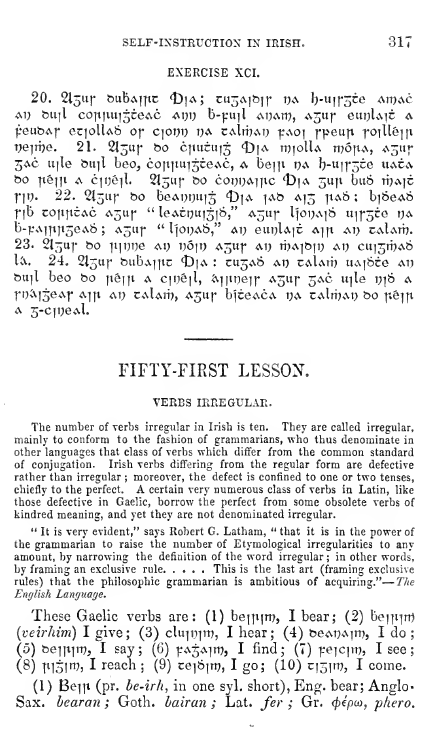
SELF-INSTRUCTION
IN IRISH. 317
EXERCISE
XCI.
20.
2l3uf
&ubAi]tc
<t)]A;
cu5A]b]|*
txv
b-ujj-jce
ArrjAC
Av
bu]\
co]t|iu]5ceAC
AT;t) b-pu]l
AUArr?,
a5U|*
eui^lAic
a
feubAi*
ecjollAO
o|*
C|Otjt)
i:)a CAlrbAi)
^ao]
fpeii|t
^oiUé|fi
tje^ri^e.
21.
2l5u|- bo
c^xutu]-^
Í)1A
miollA
Ti)ó|tA,
A5uf
5AC u|le
í3U]l beo,
co|t|tui5ceAc,
a
be]]t
t>A
b-"ir3ce
uaca
bo |xé]|i
A
cit;é]l.
2Í5U|*
bo
coT)i)Aifxc
Í)ia
5u|t
buó n)A]c
fltj.
22.
2l5u|* bo
beAi}i5ui5
Í)ia
jAb
a]3
]tA6
;
b^oeAO
rib
co]t|icAc
A5ur
"
leAci;ui5i6,"
a5U|-
Ijouaió ui|*5ce
da
b-pAi|x|i5eA6
;
A5uf
"
1]oi;a6,"
ai?
euulAjc
Aift
ai; caIatt?.
23.
2l5u|*
bo
Ttji^ne
ai)
vó]r)
A5Uf
ai)
njAjb]!)
Arj
cii]5rT)A6
U\.
24.
215111*
bubAT|tc
i)iA
: CU5A6 At)
cAlArb
UAiÓce
atj
bujl
beo
bo
jieift
a
ci^ejl,
ivifiDeii*
A5Uf*
5AC u]le
i;]Ó
a
f
i)ív]5eAf
A]|t
AT)
cAlAtb,
^511]*
bíceACA T)A
CAlrbAi)
bo
fvéiTi
A
5-cit)eAl.
FIFTY-FIRST
LESSON.
VERBS
IRREGULAR.
The
number
of
verbs irregular in
Irish
is
ten.
They
are called
irregular,
mainly to
conform to the fashion of grammarians, who
thus denominate
in
other languages
that class
of
verbs which differ
from the
common standard
of
conjugation.
Irish
verbs differing
from
the regular
form are
defective
rather than
irregular
;
moreover, the defect is confined
to one or two
tenses,
chiefly to
the
perfect.
A
certain
very
numerous
class
of
verbs in
Latin,
like
those
defective
in Gaelic, borrow
the
perfect from some
obsolete
verbs of
kindred meaning, and
yet they
are
not denominated irregular.
"
It is
very evident," says Robert G.
Latham,
"
that
it is
in the power
of
the grammarian
to raise the number
of
Etymological
irregularities
to any
amount,
by
narrowing
the
definition
of the word
irregular
; in other words,
by framing an
exclusive rule This is the last art
(framing exclusive
rules) that the philosophic
grammarian is ambitious
of acquiring."
—
The
English
These Gaelic verbs
are:
(1)
be]|tiTT>,
I bear;
(2)
bei|t]ni
(veirhim) I
give;
(3)
cluii;)]!!),
I
hear;
(4)
beAi^A^n?, I
do
;
(5)
be]]\]w,
I say;
(6)
fA^Ain?,
I
find;
(7)
peicim,
I
see;
(8)
v.]'S]^,
I reach
;
(9)
te]6]n),
I go;
(10)
ci5irr),
I
come.
(1)
Beijt
(pr.
be-irh, in
one syl. short),
Eng. bear;
Anglo-
Sax,
hearan
; Goth, bairan
;
Lat.
fer ;
Gr.
(^e'pco,
phero.
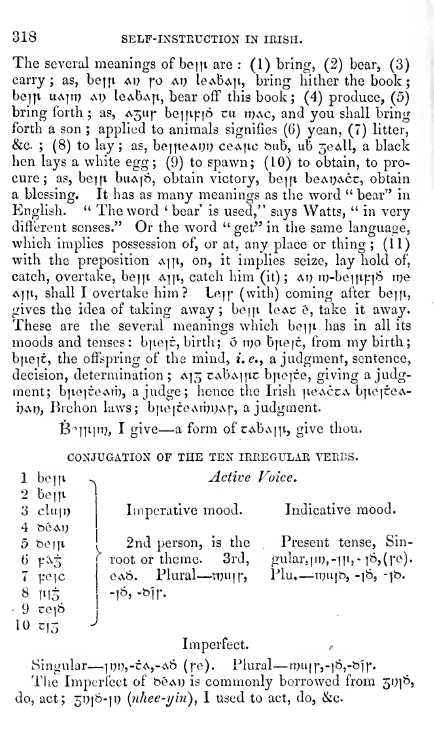
318
SELF-INSTEUCTION
IN IRISH.
The
several meanings
of
bent
are :
(1)
bring,
(2)
bear,
(3)
carry
;
as,
be^jt
ad
|*o at)
leAbAji,
bring hither the
book
;
be]|t
uAiTD
AT) leAbAjt,
bear
oíF
this
book
;
(4)
produce,
(5)
bring forth
;
as,
A5Uf
beifipió
cu
rtjAC, and you shall bring
forth
a
son
;
applied
to
animals signifies
(6)
yean,
(7)
litter,
&c.
;
(8)
to
lay
;
as,
be||teAur)
ceA]ic bub,
ub
5eAU, a black
hen lays
a
white
egg;
(9)
to spawn;
(10)
to obtain,
to
pro-
cure; as,
bei|i buAfo,
obtain victory,
be]ji
beA^ACc, obtain
a blessing. It has
as many meanings
as the word
"
bear"
in
English.
"
The word
'
bear'
is
used," says
Watts,
"
in very
diilerent
senses."
Or the word
"
get^' in the same
language,
which implies
possession of, or
at, any
place or
thing
;
(11)
with
the
preposition
A|]t,
on,
it implies
seize,
lay hold of,
catch,
overtake, be^^i a]]i,
catch
him
(it)
;
ad
m-bei|tp]6
me
A]|t,
shall
I
overtake him?
Le]|* (with) coming after
befft,
gives
the
idea of taking
away
;
bei|t
Icac
e, take
it away.
These are the several meanings
which
be]|i has in
all its
moods
and
tenses :
bjteir,
birth; ó
mo
h]ie\i,
from my
birth
;
b|te]C,
the
offspring
of the
mind,
i.e.,
a
judgment, sentence,
decision,
determination;
a]5
cAb<\||ic
bjieice,
giving a
judg-
ment; b|ie]ceAm, a judge;
hence the Irish |ieAccA.
bitejceA-
t)Ar),
Rrehon laws;
bjaeiceArbDAf,
a judgment.
B-^lJiirD,
I
give—
a
form
of CAbA^t, give
thou.
CONJUGATION OF THE
TEN IRREGULAR VERBS.
belli
beiit
clu|D
be
AD
5 bci|t
]:eic
1M5.
cejo
Active Voice.
Imperative
mood.
2nd
person, is the
root
or
theme.
3rd,
eAÓ.
Plural—
tDuip,
-1Ó,
-bir.
Indicative
mood.
Present tense.
Sin-
gular, pt),-]!!,-
] 6,
(j-e).
Plu,
—
miiib,
-^Ó,
-^b.
Imperfect.
,
Singular
—
]di)»-ca,-a&
(re).
Plural
—
TDU||',-i6,-bjf*.
The
Imperfect
of
béAD
is commonly
borrowed from
SD]^»
do, act;
SDI^-jd
{nhee-7/in),
I used to
act,
do,
&c.
